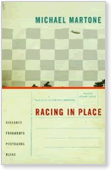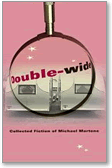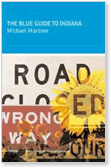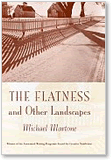Four Alabama Seasons
posted Dec 11, 2007
Winter
Even when the fans are not running under power, they feather in the breeze. Turning over, the blades mill wind. Flatbeds stacked with chicken cages piled two stories high pull in behind the wall of fans parked for a turn at the loading dock. White chickens stuff the black wire cages. The fans start up, turn, blur. The air pushes through the cages, and feathers spit out the other side. Everywhere on the ground are loose white feathers. The feathers blow across the street, cars stirring up the feathers, catch in the breeze that has not been manufactured. Breeze that is breeze. The feathers form a drift of down next to the red cedar slat fence of the city’s junkyard. Balls of feathers, hefty as chickens and as plump, tumble into the ditch. Up north, a fence like that would be strung along a highway to knock the snow out of a blizzard. Loose feathers swirl around wrecked police black and whites in the lot, begin to tar the car, coat the surface of muddy puddles left by the rain.
Spring
Spring and all is new green grass drowned by new white, white sand of the golf course groundskeeping. The rain puts a crust on the traps that must be raked until they shimmer, a sawing corduroy seen from a distance, a breeze chopping up the surface of a scummy pond. Pollen, the gist of the season, tarnishes every surface, takes away its shine, a mat of grainy finish. But today, see? Spilled sparkle of sand curved through the blacktopped intersection out front, traced a dump truck’s too-tight turn. Already, house sparrows bathe in the fresh dune, intermittent puffs of dust along the drift, a moon’s crescent in shadow. There, the white sand turns black. A mockingbird on the strung cable mimics the neighborhood’s air conditioners. All emit this compressed chatter as the sun clears the stand of oak soaked with wisteria. It will rain later and the sand will melt, forget itself. That dawn’s gesture’s just grist.
Summer
Sundays, a white city pickup truck steams slowly through the side street spraying for mosquitoes. The fog machine’s engine, an insect, drowns out the sound of the engine of the truck, a steady gearless whine. The fog itself leaps back from a funnel trailing off the bed, appears to propel the truck alone, a jet of clouds under pressure. The white spray dissipates, gets grayer as it spreads and, heavier than air, it trails the truck, a wake that spreads and skirts the curbs of the street. It spills down the hill, fills the hollow, evaporates like that afternoon’s rain turning the concrete to vapor. Later, the truck crisscrosses the grid in the neighborhood, the sound muted and amplified by the spaces between houses, the trees, the yards, and the residue settles into the bunkers of the golf course, a ground blizzard sweeping over the greens, a fluid tarp. Above, the moon breaks up, fogged in the fog as it sets through it. The summer air twice thickened.
Fall
White pine. The new needles replace needles that fall as straw, rake into springy piles in the gutter. The hardwoods stay bare-limbed, leaves exhausted. Clouds of mistletoe are caught in the branches, twig mist. The spindly azalea under-story. Too far north for Spanish moss, the trees trap trashed plastic bags, look like shit. But in the crevices and corners and on the stripped branches, lint from the cotton fields gathers. On the scored red brick and the dull mortar in between, woolly cotton patches of the stuff stuffs the joints, points the grout, a seeping spun sugar. The lint escapes the screened-in trailer trucks of the raw harvest or gets kicked up by the gleaning in the fields and threads itself into the wind, winds up coating anything with a burr enough to stick. It snows, little squalls of it accumulated in the niches, the pockets fall has turned out. It is snow that is not snow, a white reminder, until it dyes itself with all the other detritus, becomes the glue of bark and twigs and leaves, leaving nothing but filth, tilth, a kind of felt.
© 2007 Michael Martone











